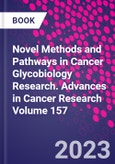Cancer glycobiology is a blazing hot area of cancer research with aberrant post-translational glycosylations on lipids and proteins considered critical for cancer development and metastasis.� The NIH/NCI Alliance of Glycobiologists for Cancer Research is a consortium of (10) tumor glycobiology laboratories funded to investigate how cancer-associated glycans (CAG) impact the development and metastasis of cancer.� The hope of this momentous effort is to discover CAGs for use as novel biomarkers to detect early-stage cancer or its aggressive behavior or, alternatively, as novel molecular targets with the promise of a curative approach to cancer therapy.� The mission of the 'Alliance' is to study structure and function of CAGs in cancer development and to provide clinically useful biomarkers for detecting cancer early or the potential of metastasis.� This charge has stimulated extensive collaborations across US and International institutions to accelerate discovery of glycan-based biomarkers to the forefront of NCI's efforts to diagnose early-stage cancer and provide curative anti-cancer therapies.�
The main goals of these research efforts are:
1.� To identify and study how cancer-associated glycans functionally impact cancer growth and metastasis
2.� To identify cancer-associated glycans that can serve as biomarkers for the detection or progression of cancer
3.� To develop cancer-associated glycans as novel therapeutic targets for the treatment and cure of cancer
This volume consists of (9) chapters, one from each funded laboratory, that reviews new methods and mechanisms� highlighting glycoconjugates and their roles as cancer biomarkers and/or anti-cancer therapeutic targets.
Please Note: This is an On Demand product, delivery may take up to 11 working days after payment has been received.
Table of Contents
1. The clinical role of glycobiology on ovarian cancer progressionRhyisa Armbrister, Laura Ochoa, and Karen L. Abbott
2. Mass spectrometry based biomarkers for early detection of HCC using a glycoproteomic approach
Yehia Mechref, Wenjing Peng, Sakshi Gautam, Parisa Ahmadi, Yu Lin, Jianhui Zhu, Jie Zhang, Suyu Liu, Amit G. Singal, Neehar D. Parikh, and David M. Lubman
3. Beyond glyco-proteomics-Understanding the role of genetics in cancer biomarkers
Andrew DelaCourt, and Anand Mehta
4. Measuring the multifaceted roles of mucin-domain glycoproteins in cancer
Nicholas M. Riley, Ru M. Wen, Carolyn R. Bertozzi, James D. Brooks, and Sharon J. Pitteri
5. Role of tumor cell sialylation in pancreatic cancer progression
Michael P. Marciel, Barnita Haldar, Jihye Hwang, Nikita Bhalerao, and Susan L. Bellis
6. The pleiotropic role of galectin-3 in melanoma progression: Unraveling the enigma
Norhan B.B. Mohammed, Aristotelis Antonopoulos, Anne Dell, Stuart M. Haslam, and Charles J. Dimitroff
7. Role of O-GlcNAcylation on cancer stem cells: Connecting nutrient sensing to cell plasticity
Giang Le Minh, and Mauricio J. Reginato
8. The biology of E-selectin ligands in leukemogenesis
Evan Ales, and Robert Sackstein
9. Heparan sulfate proteoglycans in cancer: Pathogenesis and therapeutic potential
Hua Yang, and Lianchun Wang








